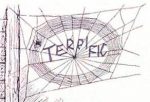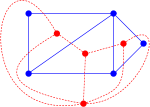Familiar mathematical structure is found in the neural activity that governs how the body orients itself and navigates its environment. Grid cells are neurons, found in areas neighboring the hippocampus, whose individual firings line up in a coordinate-like pattern according to an animal’s movement across the full extent of its environment. Their grid pattern acts […]
|
|||||

The slow and steady march toward a more and more precise definition of what we mean by information inevitably begins with Claude Shannon. In 1948 Shannon published The Mathematical Theory of Communication in Bell Labs’ technical journal. Shannon found that transmitted messages could be encoded with just two bursts of voltage – an on burst […] Not too long ago I wrote about entropy, and what has come to be known as Maxwell’s demon – a hypothetical creature, invented in 1871 by James Clark Maxwell. The creature was the product of a thought experiment meant to explore the possibility of violating the second law of thermodynamics using information to impede entropy […] When I read the subheading in a recent Scientific American article, it brought me back to some 18th century thoughts which I recently reviewed. The subheading of a piece by Clara Moskowitz’s that describes a new effort in theoretical physics reads: Hundreds of researchers in a collaborative project called “It from Qubit” say space and […] First, I would like to apologize for posting so infrequently these past few months. I have been working hard to flesh out a book proposal closely related to the perspective of this blog, and I will be focused on this project for a bit longer. However, a TED talk filmed in Paris in May came […] In 2011 John Horgan posted a piece on his blog, Cross Check (part of the Scientific American blog network), with the title, Why Information can’t be the basis of reality. There Horgan makes the observation that the “everything-is-information meme violates common sense.” As of last December (at least) he hadn’t changed his mind. He referred […] A recent issue of New Scientist featured an article by Kate Douglas with the provocative title Nature’s brain: A radical new view of evolution. The limits of our current understanding of evolution, and the alternative view discussed in the article, are summarized in this excerpt: Any process built purely on random changes has a lot […] I’ve been reading Rebecca Goldstein’s Incompleteness: The Proof and Paradox of Kurt Gödel which, together with my finding David Mumford’s Why I am a Platonist, has kept me a bit more preoccupied, of late, with Platonism. This is not an entirely new preoccupation. I remember one of my early philosophy teacher’s periodically blurting out, “See, […] 
I’m not sure what led me to David Mumford’s Why I am a Platonist, which appeared in a 2008 issue of the European Mathematical Society (EMS) Newsletter, but I’m happy I found it. David Mumford is currently Professor Emeritus at Brown and Harvard Universities. The EMS piece is a clear and straightforward exposition of […] Looking through some blog sites that I once frequented (but have recently neglected) I saw that John Horgan’s Cross Check had a piece on George Johnson’s book Fire in the Mind: Science, Faith, and the Search for Order. This quickly caught my attention because Horgan and Johnson figured prominently in my mind in the late […] |
|||||
|
Copyright © 2024 Mathematics Rising - All Rights Reserved Powered by WordPress & Atahualpa |
|||||


Recent Comments